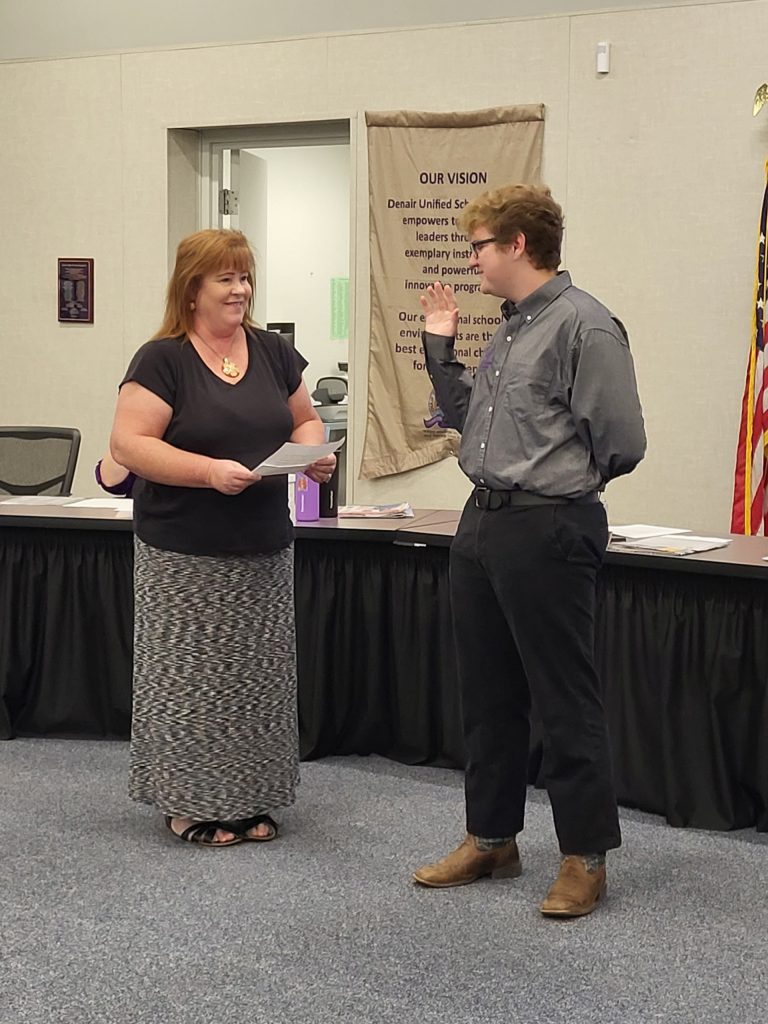

Like many public school districts in California, Denair Unified has an issue with low test scores. Superintendent Terry Metzger, with her typical candor, addressed the results during a lengthy presentation to her Board of Trustees on Thursday night.
“Many people don’t want to talk about low performance, but if we don’t talk about it how can we improve?” she said. “We have to recognize it and figure it out.”
Each spring, students in grades 3-8 and 11 take state-mandated tests in English and math. Students in grades 5 and 8 as well as high school juniors or seniors also are assessed on their science knowledge.
In math, the percentage of students meeting or exceeding state standards consistently drops as the years go by – from 20% of last year’s third-graders to just 3% of 11th-graders. The results are better in English, with the meets or exceeds percentages ranging from 23% to 35% on the tests taken last spring. In science, 16% of fifth-graders, 33% of eighth-graders and just 9% of high school students met standards in the most recent exams.
No tests were taken in 2020, when the pandemic interrupted face-to-face instruction and forced students and staff into a distance-learning computer-centric environment for nearly a year. Not surprisingly, when testing resumed in 2021, scores were lower across the board. The impact on students not meeting with teachers in person was obvious.
“While we’ve seen some small gains on state test scores across the district, there is no consistent pattern of improvement,” Metzger explained. “Based on preliminary data, most grade levels are performing a little above or a little below the pre-COVID data in English. In math, scores are generally still below pre-COVID performance.”
All students are tested – including those for whom English is a second language. Predictably, that also skews the district’s results lower. Metzger acknowledged that “the data show that our English learners are not making adequate progress in learning English.”
So what is being done to address the issue of low test scores?
Metzger said that even before COVID struck, school and district administrators were honing in on what areas of instruction needed improvement and what strategies would best support student academic growth.
“When the pandemic hit, we had already made some curriculum adoptions, started working on systematic and explicit early literacy instruction, and refining our multi-tiered systems of support,” she said.
When students and staff returned to campus in 2021, there was a lot of attention devoted to mental health. At the same time, Metzger said the district restarted its efforts to improve instruction by focusing on authentic literacy, power standards (standards that have strong connections across multiple grades and/or content areas), and on its grading and feedback systems.
Principals already have begun to scour the latest batch of test scores to analyze which strategies appear to be making a difference.
“We need to stay very focused on teaching and learning this year, asking ourselves about what is working and what is not working,” Metzger said.
Though the state has released the latest data to districts, it is not yet available for public review. Parents who are interested in knowing their child’s results can access them via the Aeries portal on the district website.
Earlier in Thursday’s meeting, trustees enthusiastically endorsed the formation of clubs focused on mental health on three campuses – Denair High School, Denair Middle School and Denair Charter Academy.
The clubs go by the acronym of NAMI for National Alliance on Mental Illness. NAMI is the nation’s largest grassroots mental health organization. It provides advocacy, education support and public awareness so that all individuals and families affected by mental illness can build better lives.
School officials and students who spoke to the board stressed that the clubs are not a place to be diagnosed, participate in group therapy or label members as having mental illness. Instead, the monthly meetings are a chance to discuss and learn about a particular mental health topic in a safe, supportive and inclusive environment. The goal is to raise mental health awareness and reduce stigma on campus through peer-led activities and education.
The club is open to all students – those with mental health conditions, those with family members with a condition, or students who are interested in a profession in the field of mental health, social work and advocacy.
A NAMI Club pilot program began in the last school year included 42 students (21 at DMS, 17 at DHS and four at DCA). The hope is to grow membership this year.
In other action Thursday, trustees:
- Ratified a new contract with the California School Employees’ Association, which represents about 100 employees who are not teachers or administrators. The deal includes a one-time 4.5% salary bonus for 2022-23 for CSEA members – the same as was given to all other employees earlier this year. The contract runs through 2025.
- Approved two out-of-town trips for students. The first is Sept. 22-24, when 13 students from Denair High’s FFA program will go to Camp Sylvester in Pinecrest to develop leadership skills. Instructors Roger Christianson, Aimee Snell and Christian Obando will accompany them. The second is Oct. 6-8, when 15 students who are part of the Committed Coyote program will attend a Youth Summit in Anaheim that includes a night in Disneyland. They will be accompanied by instructors Anthony Armas, Christy North and Zach Cherry. The program and conference will be funded through Stanislaus County Behavioral Health.
- Swore in Zachary Christianson, a junior at Denair High, as this year’s student board member.
